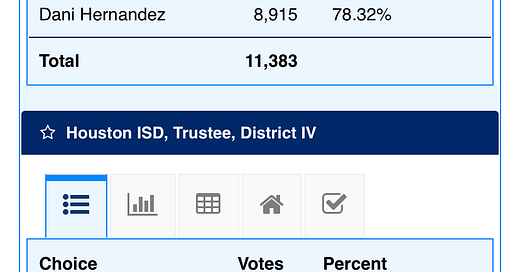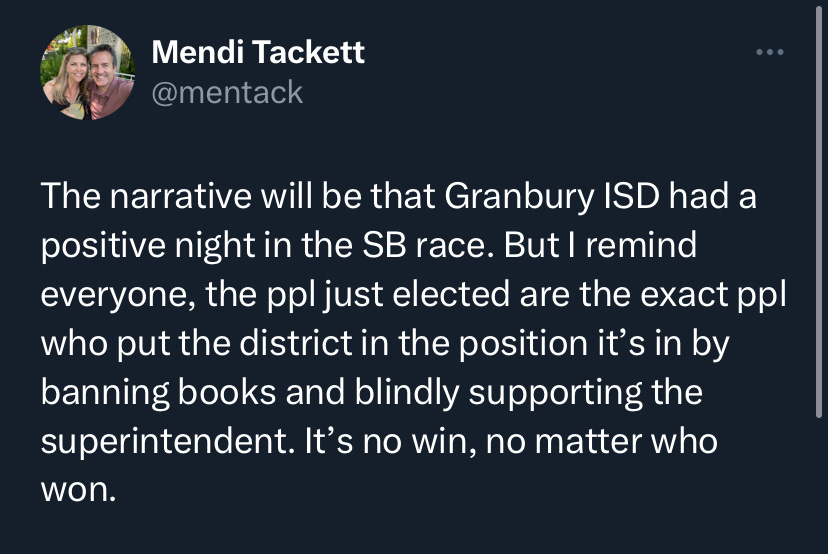November 2023 TX School Board Election Recap
How did the school board elections go on Tuesday? It's complicated, but lots of good things happened.
Since Tuesday, headlines across the country have highlighted crushing defeats book-banning school board candidates, often associated with Moms for Liberty, suffered on Election Night. That trend carried over into Texas elections, too— but only to an extent.
Let’s jump quickly into the good, bad, and mixed results from Tuesday night.
The Worst: Cypress-Fairbanks ISD
There’s no sugarcoating this one.
In my Book-Loving Texan’s Guide to the November School Board Election, I called Cy-Fair ISD the race to watch in this cycle. The district was one of the first in the state to feel the anti-“woke” wave in November of 2021, when three candidates swept onto the board by campaigning against “critical race theory.” This year, the remaining four seats were open, and allies of those three anti-woke candidates were hoping to take full control of the board. Those stakes, along with the sheer size of the district,1 made this Tuesday night’s most consequential election.
And the odds were not on the good guys’ side. All the book banners needed was one win out of the four seats; they had massive financial advantages2 and the vocal support of the Republican Party. On top of all that, in two of the races, multiple strong candidates threatened to split the pro-education votes.
Nonetheless, I was cautiously optimistic because of the amazing work done by two groups in the district, Cypress Families for Public Schools and Cy-Fair Strong Schools. Those groups organized early, and they worked hard, knocking on doors, hosting events, strategizing.
But it wasn’t enough.3 Cypress Families for Public Schools endorsed a slate of four candidates, all women, called All4CFISD. Only one, incumbent Julie Hinaman, won.
So what happened? Lots of people have rightly pointed to the fact that you simply can’t win if your votes are split among multiple candidates. That’s definitely true. Before the election, I wrote that I was “worried that those candidates will split votes, allowing an extremist to take one or both of those seats. That’s what happened in Leander’s Place 5 race last November, and in Grapevine-Colleyville this May.”
It’s possible, maybe even likely, that All4CISD candidates Tonia Jaeggi and Leslie Martone would have defeated and Todd LeCompte and Justin Ray in a two-person race. Still, we can’t ignore what happened in the one race where there was no spoiler: Book banner Christine Kalmbach narrowly defeated excellent All4CISD candidate Frances Ramirez Romero with just over 50% of the vote. And in the Position 2 race, the spoiling worked the other way, with Ayse Indemaio drawing votes away from George Edwards, and Hinaman winning her race with less than 50% of the vote.
So the other side didn’t just luck into their wins, and it would be a mistake to ignore the strategy they used to attract voters in a relatively high-turnout election. In an excellent post-mortem published this week, local leader Bryan Henry pointed out that mostly involved activating the partisan instincts of local Republicans.


That took two forms: on one hand, anti-public-education group Texans for Educational Freedom blasted the district with mailers suggesting the (bipartisan) All4CISD candidates were wild-eyed liberals, Marxists, and aligned with conservatives’ worst nightmares (Beto O’Rourke, New York teachers’ unions). It was a slimy, negative move that echoed Texans for Educational Freedom’s deceptive tactics in previous races. But for the framing to work, the reactionary candidates also had to come off as traditional, even institutional, candidates to draw in Republicans who (in other districts) have been reacting against extremist trustee candidates. To that end, they distanced themselves from Indemaio—one of the district’s most prominent book banners—and courted and received endorsements from institutional Republicans, including Ted Cruz.
You’ve probably seen the headlines saying that nationally, book-banning was a losing issue on Tuesday, with Moms for Liberty losing the majority of races where they endorsed a candidate. The Cy-Fair conservative bloc’s decision to run as buttoned-up Republicans rather than fire-breathing book banners made sense given that national mood, and it certainly worked on Tuesday.
The results could be catastrophic for students and teachers. As Henry put it:
Believing they have a mandate for change, will the new board, now that it has the votes, pass the type of divisive policies that have landed Katy ISD and Gravepine ISD in the state and national news? Will the Cy-Fair community become even more divided as a minority faction takes control of the board? It’s hard to feel hopeful.
Much better: Granbury ISD & Houston ISD
I want to be careful how I phrase this, because while I am thrilled about what happened Tuesday night in Granbury ISD and Houston ISD, my enthusiasm is tempered by larger realities in those districts.
In Granbury, wild, book-banning extremists were rebuffed by huge margins on Tuesday night. Rhonda Rogers Williams and Alejandra Muñoz were both supported by Monica Brown, the local activist who made headlines by filing police reports against school libraries for the books they carry, by Karen Lowery, the trustee who was recently censured for sneaking into a high school library to spy on its books, by Melanie Graft, her extremist colleague, and by the Blue Shark Group, a toxic media outlet that viciously attacks anyone they perceive as insufficiently conservative. They lost to more moderate conservatives Mike Moore and Nancy Alana by 25 and 31 points, respectively. That is a good thing, a rebuke of a faction that has bullied teachers, students, and school leaders for the past several years, and made life immeasurably worse for LGBTQ students in the district. And Moore and Alana did it not by running as “true conservatives” or outflanking them to the right but by campaigning on representing every student in the district and explicitly rejecting extremism.
That said, Mendi Tackett was right to point out that the people who won (Moore and Alana) are “the exact people who put the district in the position it’s in by banning books and blindly supporting the superintendent.”
I sometimes joke that many Texas elections are between someone who’s fine with removing books from schools and someone who wants to arrest educators for putting books in schools. That was the case here.
However, the results in Granbury ISD will matter to the students in the district, and they took work, strategy, and courage. I hope we can celebrate that while remembering the bigger context.
Similarly, voters in Houston sent a clear message that they are not interested in right-wing talking points, or smears of educators and current district leaders. Incumbents Dani Hernandez and Patricia Allen won their races handily (by 57 and 62 points) over extremists Fe Bencosme and Meg Seff. Bencosme has endorsed the methods imposed by new superintendent Mike Miles—including his decision to turn school libraries into detention centers.
Of course, Hernandez and Allen are returning to seats on a board that has no power, in a district where a state-imposed takeover is wreaking havoc on students’ school experience.4 But messages matter, and this one was unmistakable.
Mixed: Princeton ISD
I’m listing this as a mixed result, but technically it’s a net win: I gave incumbents Cyndi Darland and Chad Jones red and orange highlights, respectively, in my guide, with challengers Starla Sharpe and Melissa Ait Belaid highlighted in green. Darland is awful, and she won. But so did Sharpe, meaning the Princeton ISD board will likely be somewhat more open to diversity and literacy than it was before the election. Still, it would have been nice to get Darland off the board.
Good things you might have missed: Aldine, Klein, Miles
I didn’t put Aldine ISD on my doc because book bans and diversity didn’t play an explicit role the campaigns for its four open board seats. But those topics were very much in the campaign’s background.
In her role as then-president of the National School Board Association, Position 4 incumbent Viola Garcia co-signed a letter in September of 2021 to the Biden administration and Attorney General Merrick Garland asking for help dealing with the increasing number of violent threats toward school boards and violent incidents at board meetings. Because the letter argued that the violence and threats could rise to the level of domestic terrorism, right-wing media deceptively claimed that the NSBA was calling parents domestic terrorists for speaking up at school board meetings. Garcia, a respected educator and longtime board member, was singled out in particular. At one Aldine ISD board meeting, a public commenter accused Garcia of “spreading socialism and the woke agenda.”
Garcia drew three challengers; the most conservative, Steven Moore, earned support from Texas Values. In the divided race, Garcia was able to hold on to her seat.
And some great news came before election day: Klein ISD has been a hotspot for book challenges and removals for the past several years, with heat around the issue intensifying over the summer. I fully expected books to play a role in this year’s board election, but instead excellent candidates Dustin Qualls and Doug James never drew opponents. Similarly, I had my eye on rural Miles ISD, where trustee Danelle Schwertner was one of the few Texas school board to take a public stand against HB900. I worried that position might make her vulnerable to a challenge, but she was reelected unopposed.
On balance, Tuesday was a good night in Texas for literary education, for libraries, and for inclusivity in the classroom. Nonetheless, a phrase has been bouncing around my head lately: The wins are partial, but the losses are devastating. For teachers and students, the status quo of today is measurably worse than it was a few years ago. I talk to teachers all the time who are afraid to assign books like Beloved to their students, or who measure their words when discussing books like Things Fall Apart or even Shakespeare’s plays. Districts where the “good guys” have won board elections are still removing books by the hundred. And all of that is before we see the new book ratings due to HB900, which take effect in April and which threaten to take thousands of books out of all schools in the state.
There is much work to do.
With nearly 120,00 students, Cy-Fair ISD is the third largest district in the state.
In her October 30th financial filing, pro-education candidate Tonia Jaeggi reported $1027 in contributions; her opponent, the book banner Todd LeCompte, reported $13,240 and also apparently received $10,000 from CyFair 4 Liberty PAC.
To be clear, their good work wasn’t in vain. They increased turnout dramatically, shrank the voting margins, and built community connections that will prove helpful in future elections AND in resisting the bad actions sure to come from the new school board.
This piece from Asher Lehrer-Small offers a clear glimpse at what life is like right now for students in HISD under the state-imposed takeover. It’s a must-read.






Folks obsessed with Moms For Liberty have purposefully elected to not look at the fact they are not alone in destroying public education--nor are they the biggest or most well funded. Many of these showcase that too well. Thanks as always for telling and contextualizing THESE stories.
Hi there Frank. I was doing a search of my name (couldn't remember what year I got elected), and saw you mentioned me in this stack. I am still on the board and contemplating whether I should run for one more term next time. It is going to be a fight for our public schools yet again this coming legislative session. I plan on advocating more in person if I can. Anyway, thanks for the mention - I know this is from a year ago, but wanted to thank you.